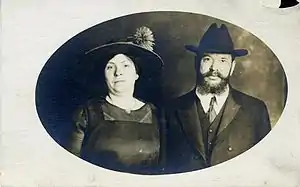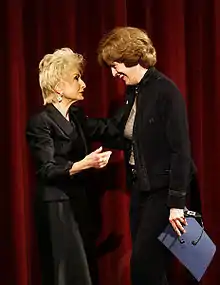Rebbetzin
Rebbetzin (Yiddish: רביצין) or Rabbanit (Hebrew: רַבָּנִית) is the title used for the wife of a rabbi, typically from the Orthodox, Haredi, and Hasidic Jewish groups, or for a female Torah scholar or teacher.
| Part of a series on |
| Jews and Judaism |
|---|
 |
|
Etymology


The Yiddish word has a trilingual etymology: Hebrew rebbə "master", plus the Slavic feminine suffix -itsa and the Yiddish feminine suffix -in. [1]
Community roles
In many Hasidic courts, rebbetzins are considered to be spiritual counselors, and give blessings. In circles such as the Hasidic dynasty of Belz, the girls schools are run by the rebbetzin.
The rabbi's wife plays an important community role, especially in small communities. In many ways, she is called on to be as knowledgeable as the rabbi in the realm of woman's observances: In this manner, for something that does not require a psak (ruling), she can be approached when a woman does not feel comfortable approaching the rabbi, or where the rabbi maybe should not be approached. For instance, the rebbetzin may be consulted in personal questions regarding female sexuality.[2]
When a rabbi is a "pulpit rabbi" (versus a teacher or a "lay rabbi"), his wife becomes something of a "first lady" of the community, and performs social tasks and "outreach" roles, freeing her husband to attend to rabbinical duties.
With the growth of independent scholarship among Orthodox women, some women have received the title on their own merit, irrespective of their husbands.
See also
References
- "Rebbetzin". Your Dictionary. Retrieved 18 September 2017.
- Wolowelsky, Joel (Winter 2002). "Rabbis, Rebbetzins, and Halakhic Advisors". Tradition: A Journal of Orthodox Jewish Thought. 36 (4): 54–63.
